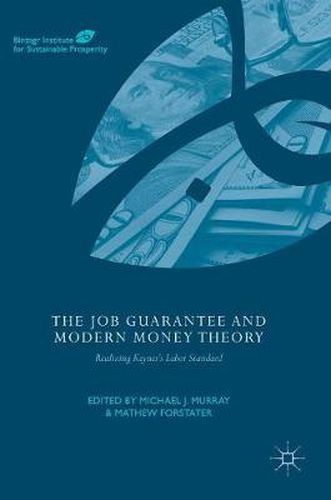Readings Newsletter
Become a Readings Member to make your shopping experience even easier.
Sign in or sign up for free!
You’re not far away from qualifying for FREE standard shipping within Australia
You’ve qualified for FREE standard shipping within Australia
The cart is loading…






This title is printed to order. This book may have been self-published. If so, we cannot guarantee the quality of the content. In the main most books will have gone through the editing process however some may not. We therefore suggest that you be aware of this before ordering this book. If in doubt check either the author or publisher’s details as we are unable to accept any returns unless they are faulty. Please contact us if you have any questions.
The contributors to this edited collection argue that a flexible Job Guarantee program able to react to an economy’s fluctuating need for work would stabilize the labor standard, the value of employment in relation to money. During economic downturns, the program would expand to provide more public sector jobs in response to private sector layoffs. It would then contract when economic growth offered private sector employment opportunities. This flexible full employment program would create a balanced, perpetually active labor force, providing the macroeconomic stability necessary to define a functioning labor standard. Just as the gold standard measured the worth of money against gold reserves, John Maynard Keynes argued, so a labor standard ought to measure the value of money in terms of its labor equivalent. However, he failed to account for the fact that, unlike a gold standard, a labor standard does not have any kind of surety that money will continue to match its value in paid work over time. Together, the contributors argue that full employment would provide this missing security and allow authorities to define the value equivalencies of money and labor, the way that money once represented its exact equivalent in gold.
$9.00 standard shipping within Australia
FREE standard shipping within Australia for orders over $100.00
Express & International shipping calculated at checkout
This title is printed to order. This book may have been self-published. If so, we cannot guarantee the quality of the content. In the main most books will have gone through the editing process however some may not. We therefore suggest that you be aware of this before ordering this book. If in doubt check either the author or publisher’s details as we are unable to accept any returns unless they are faulty. Please contact us if you have any questions.
The contributors to this edited collection argue that a flexible Job Guarantee program able to react to an economy’s fluctuating need for work would stabilize the labor standard, the value of employment in relation to money. During economic downturns, the program would expand to provide more public sector jobs in response to private sector layoffs. It would then contract when economic growth offered private sector employment opportunities. This flexible full employment program would create a balanced, perpetually active labor force, providing the macroeconomic stability necessary to define a functioning labor standard. Just as the gold standard measured the worth of money against gold reserves, John Maynard Keynes argued, so a labor standard ought to measure the value of money in terms of its labor equivalent. However, he failed to account for the fact that, unlike a gold standard, a labor standard does not have any kind of surety that money will continue to match its value in paid work over time. Together, the contributors argue that full employment would provide this missing security and allow authorities to define the value equivalencies of money and labor, the way that money once represented its exact equivalent in gold.